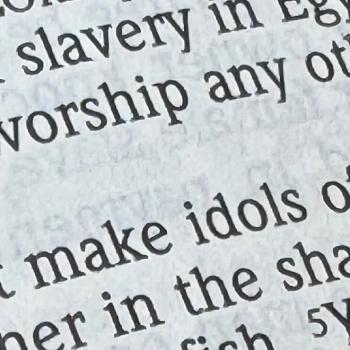
I am having a blest life. In some ways, it is almost a charmed life.
I say that, not because everything has come easily to me, or because nothing bad ever happened to me. I say it because, in ways that I won’t talk about here, my life is one gigantic save.
I’m a survivor in that I’ve walked — sometimes crawled — away from a lot of crap.
I’m a survivor in that I’ve walked — oftentimes crying my eyes out — away from a lot of betrayal from people I trusted and loved.
I’m a survivor in that I’ve walked right through — oftentimes bitter and angry about it as I did it — right through repeated barrages of very public slams and whams.
I’m not writing this to talk about my grandiose survivability. In truth, I’ve survived things that should have put me down in the dirt because my surviving was to God’s purpose. I don’t understand it all, but it may have been, in a small part, so that I can write this post and say these things today.
Surviving requires one consistent thing of you, and that one thing is more difficult than all the gritty endurance that goes along with it: You can not allow yourself to be defined by other people.
If you are going to survive in this world you must — must — learn to think for yourself about yourself. You cannot allow any person’s cruel assessments of you determine your fate or your relationship with God.
I am writing today about one specific kind of person and one specific type of cruel assessment. I mean clergy and their condemnations and cruelties toward people who get on their bad side.
To my knowledge, there is no kind of clergy — Protestant, Catholic, Jew, Muslim — who is immune to this dastardly misuse of clerical power. They are especially prone to it when someone challenges what they see as their authority, or when someone does something they find deplorable, or, most damning for them, when their followers get into a group hate of some poor hapless soul and they join in to keep them from turning on their preacher/priest/rabbi/imam.
As I said, this post is not the place where I’m going to talk about my deepest wounds. But I will talk about one very public happening that devastated me at the time. That very public happening was the very public refusal of a number of prominent protestant clergy to accept me as a Christian after I met Jesus. One of these clergy was someone who knew me, knew how sincere I was, and who joined in with his “brother” clergy rather than stand up for me.
I made the mistake of trying to talk to these pastors. That was more damaging to me as a Christian and a person than their initial — and I want to emphasize this, very pubic — attack against me had been.
It was, as I said devastating. I felt as if I had been cast out, banned, from Christianity.
It was one of the only times in my life when I hid in my bedroom for several days and wouldn’t get out of bed and just cried. I stopped going to church and withdrew from everyone but my family.
I stopped everything except believing in Jesus. That didn’t change or weaken. If anything, it grew stronger.
This wasn’t my first time to be attacked by clergy. Being attacked by clergy was my daily meat and bread during my first time in office. However, that didn’t bother me on any deep level. I was in my anti-God period at the time, and they couldn’t touch me inside my soul. I already thought they were cruel, so their behavior was little more than a confirmation.
The ability of clergy to do deep, permanent harm to another person is in direct proportion to how much that other person believes they are dealing with someone who speaks for God. When they cast off someone or “ban” them, they can only actually hurt the person who believes in their authority.
Their followers, the seekers and believers who look to them for leadership and relate to them in trust are the ones they can harm. Because nobody else gives a care what they think.
The fact that clergy can persuade people and that this persuasion can manifest in votes in elections has made them the target of a lot of people who don’t really give a care about what they think. This isn’t a matter of taking them seriously as men of God. It is a matter of tactical power politics. It’s a huge mistake to confuse that with the anguish and broken heartedness of those who believe and are seeking acceptance and love.
The person who saved me from total, absolute and permanent alienation from all organized religion was an Episcopal priest. I cold-called her because she was a woman. I could never have gone to a man. She didn’t know me, but she readily agreed to talk to me, came in to her office one day when the church was empty, just to meet me.
She saved me from the despair I was feeling, not so much by any deep eloquence, as her affirmation that I had a right to be there.
That whole experience taught me a number of lessons. It also deepened and re-taught me things I already knew.
First, I am convinced that women have a profound and necessary place in ministry. Men are only half the human race, and when they deal from positions of power with the other half of the human race, they can be extremely cruel.
Second, I know that surviving requires a refusal to give yourself over entirely to other people, and that includes clergy of all types. Because, in truth and no matter what they claim, they do not speak for God. Not always. They never speak for God when they are defending their power and privilege, when they are limiting God’s love and mercy to those whom they like or want to support. When they do that they are speaking from the depths of their own black and sinful hearts,
Third, no one, of any faith, is ever obligated to accept any other person’s degrading and destroying abandonment or cruel assessment of them as if that degradation, abandonment and cruelty is a judgement from God.
Because it does not come from God and is not His judgement. Degradation, abandonment, cruelty are not of God. Ever.
It is foolishness in the extreme to allow yourself to think that clergy are exempt from these sins. It can destroy your faith in Christ, Who, in the final analysis, is perfectly capable of speaking for Himself.
I want to emphasize that last point because it is so critical. I am a living testimony to that fact that Jesus Christ is absolutely capable of dealing with a fallen person directly and saving them all on His own.
In all my years of anti-Godism, I was roundly and soundly rebuked by various religious leaders. I was lied about and slandered from the pulpit on a regular basis. But I never had a single member of the clergy try to talk to me as one human being to another. I never had a member of the clergy talk to me about Jesus and actually try to convert me. Not once.
Years later, after my conversion, a member of the clergy in my district — who was the only one who had never lied about me — told me that he had once asked his fellow pastors, “Do any of you ever pray for Rebecca?” He said no one answered him.
There were people who did talk to me about Jesus, they even argued with me about my anti-Godism. Both of them were fellow legislators. One of them argued gently, lovingly. The other argued loudly and aggressively. Both of them had an impact on me.
I am writing this very personal and somewhat confessional post for one purpose. I want those reading it to realize that no person has the power to cast you away from the forgiveness and love of Christ.
Not only is the love of Christ greater than any sin you can commit, it is greater by far than the self-importance and narrow me-ism of all these bishops/priests/rabbis/imams who lay claim to Him and try to keep Him for themselves and use Him as their personal ticket to unmerited respect and power over other people.
I know this is not a very Catholic post, in spite of the fact that I am, in truth, very Catholic myself. But I am a child of the living God before I am anything else. And no one and nothing defines me other than that. This is the single great lesson of surviving that I have learned and re-learned and then re-learned again.
No person defines me. Christ defines me.
Those two sentences are the bedrock of survival in this world.
Do not let the petty wickedness of clergy and their ego-driven God-ownership issues convince you that you stand outside the circle of Christ’s beloveds. You do not.
Do not accept the cruel things they say to you as anything more than their own sinfulness. Nothing, not even Christ’s own Church, can separate you from the love of God.
Know that, and be unafraid.












